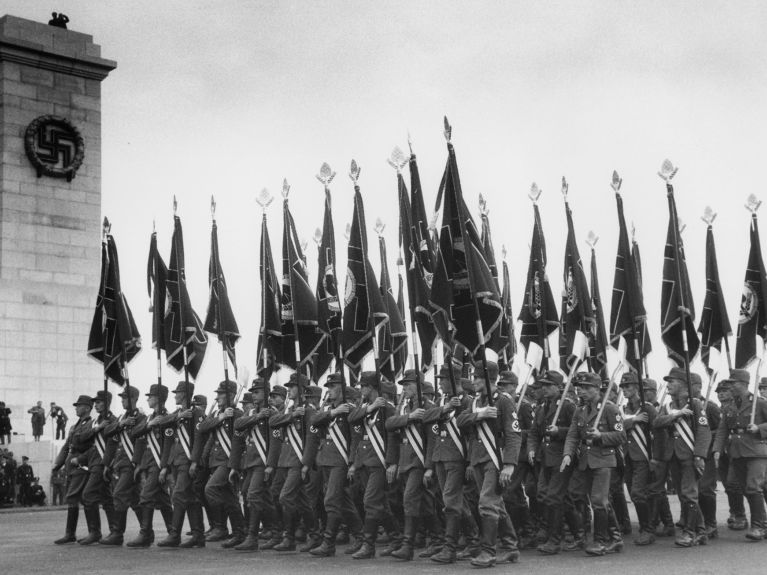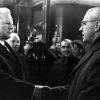The era of National Socialism
Farewell to the German question – Looking back at the long journey West: 1933–1945 The era of National Socialism.

Hitler did not come to power on the back of a major election victory but he would not have become Reich Chancellor in January 1933 had he not been the leader of the strongest party. At the last Weimar Republic Reichstag elections on November 6, 1932 the National Socialists had lost two million votes compared with the July 31, 1932 elections, while the Communists gained 600,000 thereby reaching the magic number of 100 Reichstag seats. The success of the Communist Party (KPD) whipped up fears of civil war, and it was this fear that was to become Hitler’s most powerful ally, particularly among the powerful Conservative elite. It was their recommendation to Hindenburg that Hitler had to thank for the fact that on January 30, 1933 the Reich President appointed him to the position of Reich Chancellor at the head of a predominantly conservative cabinet. Terror against anyone who dissented was not a sufficient means to hold on to power during the 12 years of the Third Reich. Hitler was able to beat unemployment within a matter of years primarily through a rearmaments program, thereby winning the support of large sections of the working classes. As a result of the ruthless exploitation of workers and natural resources in the occupied territories he had been able to spare the German masses the hardships they had had to endure after the First World War (The First World War), ensuring that he could count on their support even during the Second World War. The major successes in foreign policy during the pre-War years, headed by the re-occupation of the de-militarized Rhineland in March 1936 and the Austrian “Anschluss” in March 1938 meant that Hitler’s popularity was to reach record levels in all classes of society.
The legend of the Reich and its historic mission, which Hitler was a master in propagating, influenced in particular educated Germans. The charismatic “Fuehrer” needed their assistance if he was to make Germany a long- term power in the European order, and they needed him, too, because otherwise it seemed there was nobody in a position to make the dream of a great German Reich become reality. Even though he did not focus on it, in the electoral campaigns in the early 1930s Hitler had made no secret of his anti-Semitism. His slogans would not have won him many votes among the working classes, something he was extremely keen to do. Among educated, property-owning classes, small businessmen and farmers anti-Jewish prejudice was widespread, whereas strident anti-Semitism was frowned upon. Because they remained within the letter of the law, the Nuremberg Race Laws of September 1935, which deprived Jews of their civil rights, met with no opposition. The violent disturbances during the Reichskristallnacht on November 9, 1938 were unpopular, the “Aryanization” of Jewish property, an enormous re-distribution of assets, the repercussions of which are still being felt today, on the other hand, not. More was actually known about the Holocaust (The Holocaust), the systematic extermination of European Jews during the Second World War, than suited the regime. But knowledge of something also involves a wish to know, something of which, as far as the fate of the Jews was concerned, there was a distinct lack in Germany during the Third Reich. In German history the downfall of Hitler’s Greater German Reich in May 1945 signifies a far deeper caesura than that of the German Reich in November 1918. The Reich as such continued to exist after the First World War. Following the unconditional surrender at the end of the Second World War governmental power and the decision-making powers as to the future of Germany were assumed by the four occupying powers, the United States, the Soviet Union, Great Britain and France.
Unlike 1918, in 1945 the German political and military leaders were stripped of their powers and, inasmuch as they were still alive, sent for trial before the International Military Tribunal in Nuremberg. The landowners east of the River Elbe, who had contributed more than any other powerful elite to the destruction of the Weimar Republic and the transfer of power to Hitler lost everything: on the one hand, as a result of the cession of territories to the east of the Oder and Neisse Rivers to Poland, or, in the case of Northeastern Prussia, Soviet administration, and, on the other, due to the “land reform” in the zone under Soviet occupation. As opposed to the aftermath of 1918, after 1945 the legends of back-stabbing or a lack of guilt for the war fell on as good as deaf ears. It was just too clear-cut that Nazi Germany had unleashed the Second World War (The Second World War) and had only been suppressed from without, through the superior might of the Allies. In both the First and Second World Wars German propaganda had portrayed the democratic Western powers as imperialist plutocrats, but their own law and order as an expression of a high level of social justice. After 1945 renewed attacks on the Western democracies would have been crazy: The price paid for the contempt shown for the West’s political ideas was too high for a return to the slogans of the past to promise any success.


